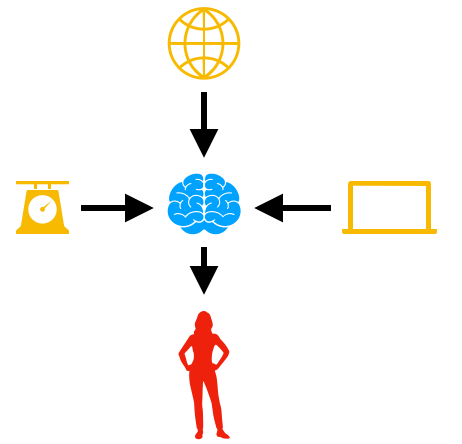
„You should take a break from work now and eat something. The recipe you wanted is on the display.“ You step up and walk into the kitchen. After having prepared the meal and eaten you step into the room again. „I advice you to meditate now for 20 minutes.“ You take your meditation pillow and sit down. After 20 minutes a sound reminds you to „come back“. „Liz wants to have a beer with you. Should I suggest to meet at 9 at the pub?“. „Yes“, you answer.
The voice is not a real person. It is the speech interface for his digital assistant. The suggestions come from observing his behavior, his calendar, his body, message, habits, and what he instructed. This yet fiction but becoming more and more real.
The world is getting more complex every day. To help us figure out what is important and filter the signals from noise artificial intelligence can be utilized. The chance in these ai systems are to free us from mental energy-draining tasks and bring order into chaos. More and more time is spent on mental tasks managing information, like using a computer (looking things up, analyzing data, configuring systems to get us more insights). Work is increasingly bodyless and happening in human designed environments. A personal AI assistant (paia) can be the assistant for everyone, and reconnect us with our body. Smart home and paia are inherently connected in the concept of ubiquitous computing. I already analyzed in a previous blog post (German) how the internet changed its „presence“ from gates to the cyberspace to a virtual space-enriching layer of reality. One component of paia is the speech interface. Speech interfaces accelerate the development of paia, as information transmitted over the medium of speech must be condensed to fit into spoken language. A paia has access to personal information. This transforms the ai to a personal assistant. It can also be accessed by any network-connected device which has a display. Paia are already used by millions of people and use will grow even more. 12% of the people in Germany already have a smart speaker at home¹ and 50% are interested in these devices². Every smart speaker has some form of personal AI assistant (paia). Operating systems like macOS and Windows 10 now come with a speech assistant.
How the internals of such a system work or how it is exactly operated, will not be covered here. We will now look at the prerequisites to build and operate such systems. To operate a paia needs data about you. The data can come from the software you use or data from your smart home. To provide this data to the paia we need
- data collecting systems which we can trust and
- convenient data interfaces to create a data flow from the source to the assistant. More data is generated with more and more sensors being installed everywhere (smart home).
The crucial part of the first point is trust. The concerns in these systems are that our privacy should be respected and maintained. But can we trust these systems, when they only work opaquely and sending the data to foreign servers? It does not help the cause of trust that this emerging field is currently controlled by the big tech-feudalistic companies like Amazon or Apple.
To summarize some risks:
- Government access (surveillance)
- Data gathering companies
- Other malicious attackers
- Intransparent software
- Data leaks
I see a lack of privacy-aware solutions to collect data on yourself. This is something companies, independent developers, citizens or governments can build. Trust in others is not needed if we are in control. Then we only need to trust in ourselves and the inner working of the system.
Furthermore, we, as users, need to be able to trust the judgment of the AI. How can we do this? We need transparency and control. The AI needs to have configurable components or - sticking to the image of a virtual person- we need to be able to teach the obedient AI (see this blog post to see, how this sometimes not the case). The question of who controls our tech is a political one. In the instance of the Amazon Echo system, user control is partially derived by installing „skills“. Skills are like apps for your voice assistant. The problem with that is, that the skill store is another company controlled app store. These app or skill stores enable tech-feudalism. How a company controlled app store can be a problem could just be observed in the case where apple removed the Hong Kong demonstration app from the app store.
The second premise of a paia is a technical one. There needs to be some protocol to create a dataflow. I present a solution utilizing privacy by design for user-generated data in an app.